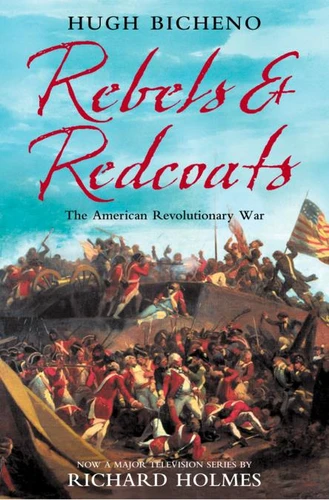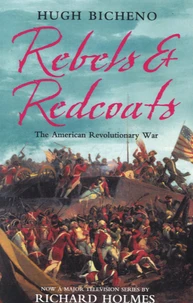Rebels and Redcoats. The American Revolutionary War
Par : ,Formats :
Disponible dans votre compte client Decitre ou Furet du Nord dès validation de votre commande. Le format ePub protégé est :
- Compatible avec une lecture sur My Vivlio (smartphone, tablette, ordinateur)
- Compatible avec une lecture sur liseuses Vivlio
- Pour les liseuses autres que Vivlio, vous devez utiliser le logiciel Adobe Digital Edition. Non compatible avec la lecture sur les liseuses Kindle, Remarkable et Sony
- Non compatible avec un achat hors France métropolitaine
 , qui est-ce ?
, qui est-ce ?Notre partenaire de plateforme de lecture numérique où vous retrouverez l'ensemble de vos ebooks gratuitement
Pour en savoir plus sur nos ebooks, consultez notre aide en ligne ici
- Nombre de pages352
- FormatePub
- ISBN978-0-00-739091-5
- EAN9780007390915
- Date de parution30/01/2014
- Protection num.Adobe DRM
- Infos supplémentairesepub
- ÉditeurWilliam Collins
Résumé
Due to the level of detail, maps are best viewed on a tablet.
Controversial and revisionist history of America's first civil war. Published with hugely successful accompanying four-part BBC TV series - written and presented by star military historian, Richard Holmes.
Most people view the American Revolutionary War of the 1775-83 (also known as the War of Independence) as a popular struggle for liberty against an oppressive colonial power.
REBELS & REDCOATS by historian Hugh Bicheno, written to accompany a four-part BBC television series presented by Richard Holmes, demonstrates that it was in fact America's first civil war. Employing the latest scholarship and vivid eyewitness accounts, Bicheno argues t that the war was the product of a broad French imperial design, and greed of many prominent colonials. As many Americans remained loyal to the Crown as rebelled against it, and the reasons for adopting or changing sides were as varied as the men and women who had to make the unenviable decision.
Native and African Americans overwhelmingly favoured the British cause. We hear not only the voices of Rebels and Redcoats, but also of German mercenaries and aristocratic French adventurers, as well as Indian warriors and Black slaves fighting for their independence, which together shed new light on events that forged a nation. The main loser was the French monarchy, which ruined itself to gain no lasting influence over the United States, while unable to exploit the distraction the war created either to invade Britain or gain control of the West Indies, which at the time were considered a far bigger prize than all of North America.
REBELS & REDCOATS by historian Hugh Bicheno, written to accompany a four-part BBC television series presented by Richard Holmes, demonstrates that it was in fact America's first civil war. Employing the latest scholarship and vivid eyewitness accounts, Bicheno argues t that the war was the product of a broad French imperial design, and greed of many prominent colonials. As many Americans remained loyal to the Crown as rebelled against it, and the reasons for adopting or changing sides were as varied as the men and women who had to make the unenviable decision.
Native and African Americans overwhelmingly favoured the British cause. We hear not only the voices of Rebels and Redcoats, but also of German mercenaries and aristocratic French adventurers, as well as Indian warriors and Black slaves fighting for their independence, which together shed new light on events that forged a nation. The main loser was the French monarchy, which ruined itself to gain no lasting influence over the United States, while unable to exploit the distraction the war created either to invade Britain or gain control of the West Indies, which at the time were considered a far bigger prize than all of North America.
Due to the level of detail, maps are best viewed on a tablet.
Controversial and revisionist history of America's first civil war. Published with hugely successful accompanying four-part BBC TV series - written and presented by star military historian, Richard Holmes.
Most people view the American Revolutionary War of the 1775-83 (also known as the War of Independence) as a popular struggle for liberty against an oppressive colonial power.
REBELS & REDCOATS by historian Hugh Bicheno, written to accompany a four-part BBC television series presented by Richard Holmes, demonstrates that it was in fact America's first civil war. Employing the latest scholarship and vivid eyewitness accounts, Bicheno argues t that the war was the product of a broad French imperial design, and greed of many prominent colonials. As many Americans remained loyal to the Crown as rebelled against it, and the reasons for adopting or changing sides were as varied as the men and women who had to make the unenviable decision.
Native and African Americans overwhelmingly favoured the British cause. We hear not only the voices of Rebels and Redcoats, but also of German mercenaries and aristocratic French adventurers, as well as Indian warriors and Black slaves fighting for their independence, which together shed new light on events that forged a nation. The main loser was the French monarchy, which ruined itself to gain no lasting influence over the United States, while unable to exploit the distraction the war created either to invade Britain or gain control of the West Indies, which at the time were considered a far bigger prize than all of North America.
REBELS & REDCOATS by historian Hugh Bicheno, written to accompany a four-part BBC television series presented by Richard Holmes, demonstrates that it was in fact America's first civil war. Employing the latest scholarship and vivid eyewitness accounts, Bicheno argues t that the war was the product of a broad French imperial design, and greed of many prominent colonials. As many Americans remained loyal to the Crown as rebelled against it, and the reasons for adopting or changing sides were as varied as the men and women who had to make the unenviable decision.
Native and African Americans overwhelmingly favoured the British cause. We hear not only the voices of Rebels and Redcoats, but also of German mercenaries and aristocratic French adventurers, as well as Indian warriors and Black slaves fighting for their independence, which together shed new light on events that forged a nation. The main loser was the French monarchy, which ruined itself to gain no lasting influence over the United States, while unable to exploit the distraction the war created either to invade Britain or gain control of the West Indies, which at the time were considered a far bigger prize than all of North America.




